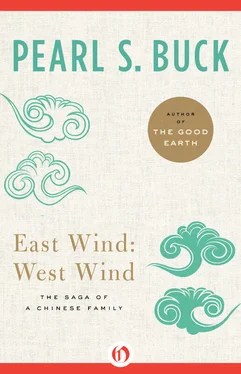The next day she ordered opaque shell lattices to be placed over the moon-gate, and I never looked through it again.
But my mother was none the less kind to the Fourth Lady. The servants praised her loudly for this forbearance, although I think the other concubines would have been glad to see her cruel, as a first lady so often is to the others. Perhaps my mother knew what was in store.
After her baby was born, the Fourth Lady thought that of course my father would take her about with him again. She did not nurse the child herself lest she spoil her beauty. Instead she gave him to a sturdy slave-woman, whose child, a girl, had of course not been allowed to live. This slave was a thick-bodied woman with a foul mouth, but the little boy slept in her bosom all night, next her flesh, and was carried in her arms all day. His own mother paid little attention to him, except to dress him in red on a gala day and put little cat-faced shoes upon his feet and play with him a brief while. When he cried, she thrust him impatiently back into the slave’s arms.
But the boy gave her an insufficient hold upon my father. Though legally she had repaid him, she had daily to seek cunning devices to capture his senses, as our women have ever had to do. Even her cunning, however, was not enough. She was not so beautiful as she had been before the child’s birth. Her smooth, pearly little face sagged just enough to take away her delicate youth. She dressed herself in her jade-green gown and hung pendants in her ears and gave her little tinkling laugh. My father appeared as pleased with her as ever; only, when he went on his next journey he did not take her with him.
Her astonishment and rage were dreadful to see. The other concubines were secretly pleased and smiled a great deal as they pretended to comfort her. My mother was a little kinder to her than usual. I heard Wang Da Ma mutter angrily,
“Oh, yes, now we shall soon have another idle woman to feed. He is weary of this one already!”
From that day the Fourth Lady brooded. She became discontented, with fits of irritability and profound weariness of the humdrum existence in a women’s courtyard. She had been used to the feasting and the admiration of men. She became very melancholy, and later even tried to throw away her own life. But that was after my marriage. It is not to be supposed from all this that our life at home was a sad one. It was really very happy, and many of our neighbors envied my mother. My father had never ceased to respect her for her intellect and for her capable management of his affairs. She never reproached him for anything.
Thus they lived in dignity and peace.
O my beloved home! My childhood passes before me in pictures illumined as by firelight. The courtyards, where I watched the lotus-buds burst into flower in the pool at dawn, and the peonies bloom in their terraces; the family rooms, where the children tumbled on the tiled floor, and the candles flared before the house-gods; my mother’s room, where I see her stern, delicate profile bent over a book, the huge canopied bed in the background.
Most dear of all is the stately guest-hall, with its ponderous black teak couches and chairs, the long carved table and the scarlet satin curtains in the doorways. Above the table hangs a painting of the first Ming emperor — an indomitable face with a chin like a stone cliff — and on each side of this painting hang the narrow scrolls of gold. The whole south side of the hall is in carved window frames, latticed with rice-paper. This paper sheds a soft moonstone light over the dark dignity of the room, reaching even to the heavy beams of the ceiling and lighting up the vermilion and the gold of their painted edges. To sit quietly in this hall of my ancestors and watch the twilight fall upon it in dusky silence has ever been to me like music.
On the second day of the New Year, which is the day for great ladies to call upon one another, the hall is delicately gay. Into its dim age comes a host of brilliantly dressed ladies; there is light and laughter and bits of formal talk, and the slaves pass tiny cakes in red lacquered sweetmeat trays. My mother presides over it all with grave courtesy. The old beams have looked down upon the same scene for hundreds of years — black heads and dark eyes, rainbow silks and satins, jade and pearl and ruby hair ornaments, and turquoise and gold flashing upon slender ivory hands.
O my beloved home — O dearly beloved!
I see myself, a little solemn figure clinging to my brother’s hand, standing beside the fire in the court, where the kitchen-gods are about to be burned. They have had honey put on their paper lips so that they may ascend to heaven with sweet words and forget thus to tell of the times when the servants quarreled, and when they stole food from the bowls. We are filled with awe at the thought of the messengers to the distant unknown. We do not speak.
I see myself on the Dragon Festival, with my best feast-day gown of pink silk embroidered with plum blossoms, scarce able to wait until evening when my brother will take me to see the dragon boat upon the river.
I see the bobbing lotus lantern that my old nurse brings me at the Feast of Lanterns, laughing at my excitement when night comes and I may light the smoky red candle within.
I see myself walking slowly beside my mother into the great temple. I watch her place the incense in the urn. I kneel reverently with her before the god, and fear is cold within me.
I ask you, My Sister, with years like this to shape me, how have I been prepared for such a man as my husband? All my accomplishments are of no avail. I plan in secret that I will wear the blue silk coat with black buttons cunningly wrought in silver. I will place jasmine in my hair, and upon my feet the pointed black satin shoes embroidered in blue. I will greet him when he enters. But when it has all come to pass, his eyes escape hastily to other things — his letters upon the table, his book. I am forgotten.
Within my heart is a writhing fear. I remember a day before my marriage. It was the day on which my mother wrote two letters swiftly with her own hand, one to my father and one to my future mother-in-law, and dispatched them in great haste by the old gate-keeper. I had never seen her so perturbed. On that day I heard the servants whisper that my betrothed wished to break our engagement because I was uneducated and had bound feet. I burst into tears, and the servants were frightened and swore that it was not I of whom they spoke, but of Lady Tao’s fat second daughter.
Now I remember this and ponder it in great agitation. Could it have been I? Servants are ever liars! Yet I am not untaught. I have been carefully trained in all household matters and in the care of my person. As for my feet, surely no one could prefer huge, coarse ones like those of a farmer’s daughter. It was not I — it cannot be I — of whom they spoke!
WHEN I HAD SAID farewell to my mother’s home and stepped into the great red chair to be carried to the home of my husband, I never dreamed I should not please him. For myself, I remembered and was glad that I am small and lightly framed, with an oval face that others are pleased to look upon. At least here he would not be disappointed.
During the wine ceremony I stole a glance at him from under the red silken strands of my veil. I saw him standing there in his stiff, black, foreign clothes. He was tall and straight like a young bamboo. My heart went cold and hot together. I was sick for his secret glance. But he did not turn his eyes to pierce my veil. We drank the cups of wine together. We bowed before his ancestral tablets. I knelt with him before his august parents. I became their daughter, leaving forever my own family and clan. He never looked at me.
Читать дальше











